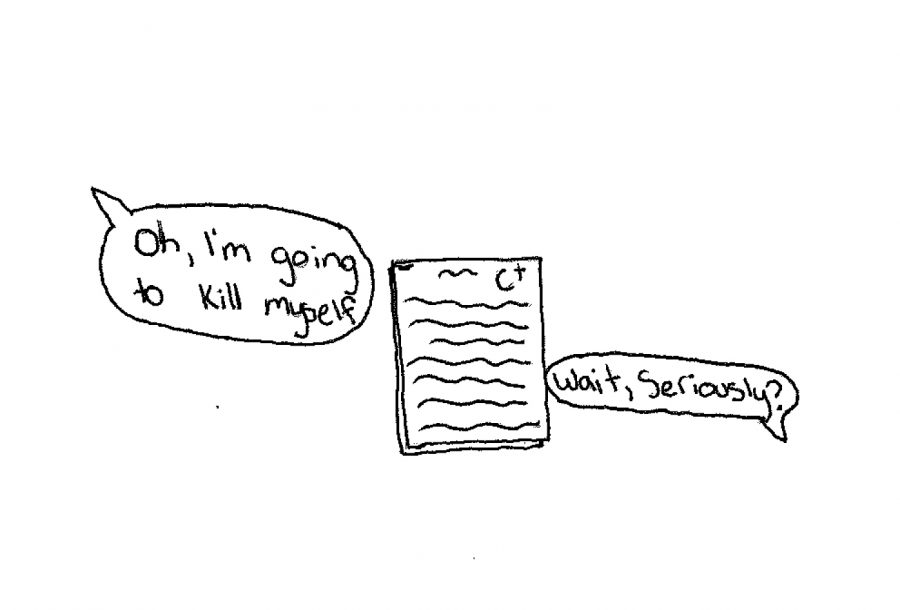Hyperbole or Truth: When is it More Than Just a Joke?
We were walking into science class, about to have a test. Everyone was talking about things to remember “it was a subduction zone” or “two denser plates.”
Then a girl said, “I want to die.” Everyone laughed. Everyone except the boy in the back. He forced a weak smile and walked into class. He was glad some people thought that was funny. It ripped him apart to hear this, but how would they know.
It was just a joke.
He went ahead and started to get ready for the test he didn’t study for because he spent all of last night debating if it was worth living another day.
Exaggerated statements have become incredibly popular. Most people find it funny, but what about the silent sufferers who know what it really feels like to be depressed or anxious? How do they feel?
Depression, anxiety, PTSD—these are all mental illnesses that have become a major problem all over the world. Lots of people tend to make jokes about mental illness–I want to die, this is so depressing, kill me now–when really they just got a C on their math test. It’s just a minor inconvenience, but they have to make such a big deal out of it.
Now, many people think these jokes are harmless and they just normalize depression or other mental illnesses, but in reality many psychologists disagree. Janine Hobson, a comedian who suffered from mental illness, said that she used jokes as her way of coping. Psychologist Howard Samuels, founder of The Hills Treatment Centre in Los Angeles and a specialist in this area, however says that “When we laugh at mental health issues, we lessen the seriousness of the condition and dehumanize sufferers.”
This can actually result in their condition getting far worse. If we wanted the suicide rates to go down, then these hyperbolic statements should decrease in their frequency. People should think more about what they say and check in on the people who do use these statements.
I talked to my peers and collected some data about the issue. Assuming they all answered truthfully, only 11 percent of all the kids didn’t use hyperbolic statements. However 100 percent of the kids knew someone who suffered from mental illness. This is completely unacceptable as that means almost all the victims are constantly hearing others complain about their minor inconveniences whilst they suffer from something far worse.
I also had someone say that they didn’t really react when someone said a hyperbolic statement as, “They are just so commonly used, like it doesn’t mean stuff.” However, I know that “many victims joke about their conditions because its a coping mechanism. If you hear people saying these statements, you must act right away,” according to the Substance Abuse and Mental Health Administration.
So, if we all made it a point not to make jokes about something we have no experience with, such as depression or suicidal thoughts, it would be easier to see who needs help thus decreasing suicide rates.
Now you may be wondering why this is so important. It’s simply because the number of depressed people is increasing: the population of depressed people goes up by 6.7 percent every year. That means if we started with 1/100 depressed people, next year there would be around 8/120 people depressed. The denominator increases due to increasing population and the numerator increases due to the denominator. So if we don’t start trying to help those in need, eventually the entire population could suffer from a mental illness.
Although the hyperbolic statements aren’t the main cause of the rise in depression, it could most certainly benefit everyone if we stopped misusing them.
We used to be able to pick up on symptoms as the sufferer would use hyperbolic statements; however, they have become so common it is hard to pick up on them. Over the past few years, the biggest red flag has been jokes about depression or ending one’s life, according to SAMHSA. However now so many use it to cope with just an ounce of sadness depressed people just fly under the radar. So now if we have an increasing population and no method to actually identify sufferers, then we have a problem.
To conclude, if we don’t stop making hyperbolic statements, people will no longer feel that they can reach out for help. These lies dehumanize sufferers and normalize mental illness which in turn causes statistics to increase. Stop laughing when your friend makes one of these jokes; check in with them to see if they are okay.



